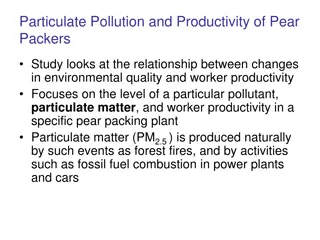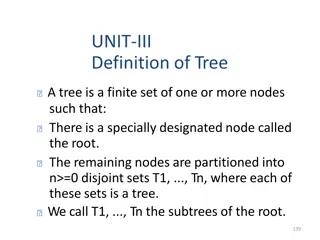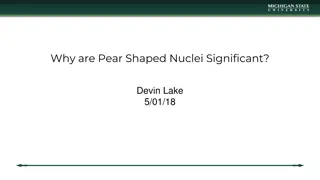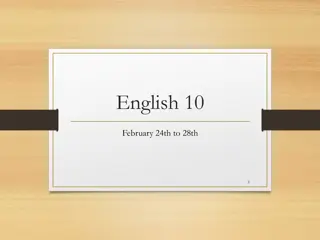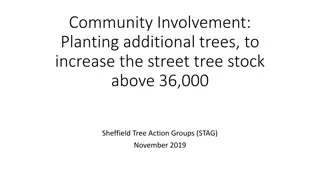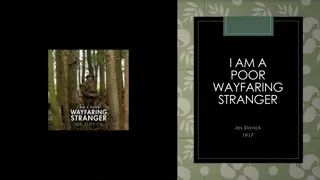Contemplation of Life in "To a Blossoming Pear Tree
The poem "To a Blossoming Pear Tree" by James Wright juxtaposes the beauty and freedom of nature with the despair and brutality of human existence. The speaker envies the tree's purity and innocence, contrasting it with a grim encounter with an old man in a dark, wintery street. This reflection highlights the harsh reality of human nature in contrast to the idealized natural world.
Download Presentation

Please find below an Image/Link to download the presentation.
The content on the website is provided AS IS for your information and personal use only. It may not be sold, licensed, or shared on other websites without obtaining consent from the author.If you encounter any issues during the download, it is possible that the publisher has removed the file from their server.
You are allowed to download the files provided on this website for personal or commercial use, subject to the condition that they are used lawfully. All files are the property of their respective owners.
The content on the website is provided AS IS for your information and personal use only. It may not be sold, licensed, or shared on other websites without obtaining consent from the author.
E N D
Presentation Transcript
Explicating a Poem An explication is a paraphrase or summary of a poem its basic situation and what it says. It doesn t interpret; the idea is to just objectively report, in your own words, what s happening in the poem. Explication can help you to get a handle on even a difficult piece, and is also useful when discussing poetry in an essay. 1
To a Blossoming Pear Tree Beautiful natural blossoms, Pure delicate body, You stand without trembling. Little mist of fallen starlight, Perfect, beyond my reach, How I envy you. For if you could only listen, I would tell you something, Something human. Beautiful natural blossoms, How could you possibly Worry or bother or care About the ashamed, hopeless Old man? He was so near death He was willing to take Any love he could get, Even at the risk Of some mocking policeman Or some cute young wiseacre Smashing his dentures, Perhaps leading him on To a dark place and there Kicking him in his dead groin Just for the fun of it. An old man Appeared to me once In the unendurable snow. He had a singe of white Beard on his face. He paused on a street in Minneapolis And stroked my face. Give it to me, he begged. I'll pay you anything. I flinched. Both terrified, We slunk away, Each in his own way dodging The cruel darts of the cold. Young tree, unburdened By anything but your beautiful natural blossoms And dew, the dark Blood in my body drags me Down with my brother. 2
An Explication of James WrightsTo a Blossoming Pear Tree The speaker is apparently sitting or standing before a pear tree, presumably in spring, in no particular location. He speaks to the tree, and describes it as delicate, fearless, unreachable, and enviable, and then says that he will tell the tree something human. In the second stanza, the speaker recalls an incident in which an old man propositioned him on a dark, wintery street in Minneapolis. Addressing the tree again as beautiful and natural, he then muses on how free the tree must be of concern for the desperate and nearly dead old man, who risks pointless and even sadistic violence on the streets in his pursuit of love. In the third and final stanza, the speaker again remarks on how unburdened, young, beautiful, and natural the tree, and then makes an abrupt assertion about how his dark blood brings him down with his fellow man. 3
An Interpretation of James Wrights To a Blossoming Pear Tree James Wright s poem To a Blossoming Pear Tree is about the terrible burden and fatality of being human in sharp contrast to what he sees as an ideal, free, and beautiful natural world. To be human is to be broken and even sick although, in the end, Wright s view is tempered by a paradoxical insight. The speaker of the poem first addresses the tree in terms of its delicacy, beauty, tenderness, and purity, saying that he envies it. Indeed, one can feel the longing in his voice: how I envy you. He then recounts an incident which is everything that the pear tree is not: ugly, shameful, suffering, and brutal a world, in other words, that is human and anything but natural. Interestingly, the speaker describes the encounter in a way which implicates himself in the old man s shame. He says that he flinched, when he receives the sexual proposition, and that he slunk away, just like the old man, doing what he can, just like the old man, to avoid the cold, which may include pointless or even sadistic violence on the streets. This picture of the human world is in direct and stark contrast to the world of the pear tree. By the time the speaker comes back to present moment and the tree and, for a third time, describes it as free, youthful, beautiful, and natural, he has given us a very bleak view of humanity indeed. Interestingly, however, in describing what is the bleakest in the human condition our entrapment in our own bodies, in desire, loneliness, and need he is at the exact same time asserting the brotherhood of all people. Our connection to each other may be nothing more than the blood that runs in our veins and our common mortality, but it is a connection nonetheless. Love and connectedness, in Wright s poems, are always hard-won and always redeem what would otherwise be intolerable suffering. 4
An Interpretation of James Wrights To a Blossoming Pear Tree James Wright s To a Blossoming Pear Tree is typically understood as a very compassionate poem in which a man identifies with a desperate bum on the streets, contrasting the brutal and fateful human world to the natural world of a blossoming tree. Wright s poem is a moving one, and we should take care not to read against its ultimately humane message. It s hard not to notice, however, the gendered language of the poem, especially in the speaker s description of the tree. Ultimately, and despite the poem s best intentions, it relegates women to a position of absolute, even inhuman Other. The world of men is equated with humanness; the world of women with the impossibly Ideal. From the very first stanza, we get a description of a tree which is both wholly separate from the speaker and also interestingly feminine, even slightly childlike. The tree is describes as ________ ____________________________________________________________________________________ ____________________________________________________________________________________ ____________________________________________________________________________________ ____________________________________________________________________________________ ____________________________________________________________________________________ ____________________________________________________________________________________ _________________________________________________________ 5














